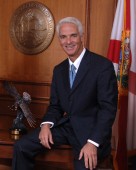
Governor Charlie Crist of Florida
One of my favorite opinion columnists, Gail Collins of The New York Times, had some interesting remarks yesterday on the teaching profession in a piece about Governor Charlie Crist of Florida. Crist, having failed to win the Republican nomination for U.S. Senate, is now hoping to prevail in this fall’s general election as an Independent. (This strategy has worked before, of course — recall Joe Lieberman’s failure, in 2006, to win the Democratic primary for U.S. Senate in Connecticut. Lieberman ran, and won, as an Independent by securing 70 percent of the votes cast by Republicans. It’s no wonder many now see Lieberman as more Republican than Democrat, but that’s another matter for another time.)
How does teaching figure into the picture? Well, Gov. Crist curried favor among teachers with his recent refusal to sign state legislation that would have weakened teacher tenure rules in Florida, while also linking teacher pay to student test scores.
Here’s what Gail Collins had to say about the teaching profession:
“Can I digress, people, and say that while it’s important to make teachers accountable, telling them their jobs could hinge on their students’ grades on one test is a terrible idea? The women and men who go into teaching tend, as a group, to be both extremely dedicated and extremely risk-averse. The stability of their profession is a very important part of its draw. You do not want to make this an anything-can-happen occupation, unless you are prepared to compensate them like hedge fund traders.
It’s a terrible time for American teachers — almost every school district is facing monster budget cuts, and a number of politicians have tried to make them the villain in the story. (New Jersey’s governor, Chris Christie, recently accused them of using their students as ‘drug mules’ to convey information on school budget votes.) If Crist defeats Rubio with the teachers’ support, it will certainly help them push back.”
I especially appreciate Collins’ reminder about the importance of stability in the teaching profession, so much so that I’ll quote the relevant line again for emphasis: “You do not want to make this an anything-can-happen occupation, unless you are prepared to compensate them like hedge fund traders.” Indeed — and we know how well things have worked out with hedge-fund traders lately!
Another wonderful piece on the teaching profession that I recently read is Mike Rose’s “Reform: To What End?” in Educational Leadership (April 2010). Rose is a professor in the Graduate School of Education & Information Studies at UCLA, best known for his 1989 bestseller Lives on the Boundary: A Moving Account of the Struggles and Achievements of America’s Educationally Underprepared.
In “Reform: To What End?”, Rose wonders whether any of the reforms now fashionable among policymakers and politicans can possibly lead to improved teaching and learning, which are really the only things that matter. His conclusion is: probably not.
Rose then dreams about what meaningful professional development might mean for teachers — and, in turn, for students. Here are some of his insights:
“What if we could channel the financial and human resources spent on the vast machinery of high-stakes testing into a robust, widely distributed program of professional development? I don’t mean the quick-hit, half-day events that so often pass for professional development, but serious, extended engagement of the kind that the National Science Foundation and the National Writing Project might offer…
These programs typically take place in the summer (the National Writing Project runs for four weeks), although there are other options, including ones that extend through part of the school year. Teachers work with subject-matter experts; read, write, and think together; learn new material; hear from others who have successfully integrated the material into their classrooms: and try it out themselves.”
Why would better professional development matter, you ask? Because it’s the chief way teachers get better at their craft, and only better teachers will get us the better student outcomes about which we all dream. Here’s Rose once more:
“Enriched, widely available professional development would substitute a human capital model of school reform for the current test-based technocratic one. And because such professional development would positively affect what teachers teach and how they teach it, it would have a more direct effect on student achievement.”
Too bad the kinds of professional development Rose describes aren’t widely available to teachers today. But maybe would-be reformers will realize Rose is onto something of great significance here.



